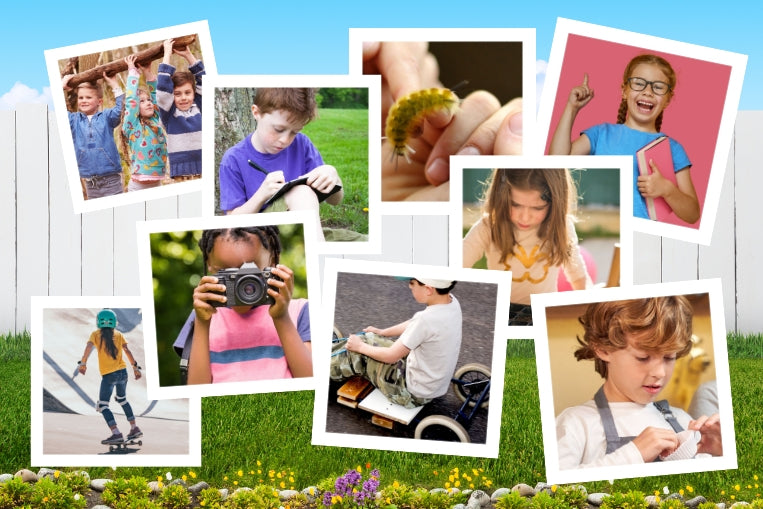
30 Fun Summer Activities And Projects Kids Can Do By Themselves
This post may contain affiliate links. Disclosure Policy
Luci McQuitty HindmarshSummer boredom busters that keep kids thoroughly occupied (and learning!)
The summer is here!
Which means a daily array of fresh activities to entertain the kids doesn’t it?
Well, of course it’s fun to have a summer bucket list and do stuff you don’t get a chance to during school term time.
But kids do actually need to learn to entertain themselves?
If they don’t, they’re in danger of never developing the independence, persistence and initiative they need for so much of life.
My friend teaches at a top UK University and constantly complains that her students … all ‘high achievers’ … totally lack initiative.
They’re used to being told what to do every single step of the way.
Plus, for many of us parents, we can’t just drop everything and spend every moment with our kids.
There’s work, there’s household stuff, there’s… our sanity!
How to get kids to entertain themselves
So as you’re planning a summer of fun, do factor in time for your kids to do their own thing.
One way to instigate this is to get the ball rolling in week one of the summer holidays.
Make it the starting point for summer long projects that kids can dip in and out of all through the long summer vacation.
Most importantly, kids can immerse themselves in the projects without constant input from you – or any other adults.
It may be that you need you to get things going either by talking about cool things you did when you were a kid, or by asking your kids for ideas for the projects they’d like to do.
Then you can help them get the stuff they need so that they are all set up.
But after that, it’s down to them to get on with their projects and to enjoy the freedom of having their own project that is nothing to do with anyone but themselves.
There are so many long summer vacation projects that kids can take on.
But if you are in need of inspiration, check out the list of summer vacation project for kids ideas below.
1. Commit to a Summer Reading Challenge

Encourage your kids to dive into a summer reading challenge by focusing on a series of books or a specific genre.
This can be a fun way to keep their minds active and engaged during the break.
You can create a reading list together, set goals, and even have small rewards for every book or series completed.
For more tips, check out my post on my other website, Mumsmakelists.com How To Keep Kids Reading Through The Summer.
2. Learn to Roller Skate or Skateboard

Learning to roller skate or skateboard can be an exciting and physically active way for kids to spend their summer.
Not only does it improve balance and coordination, but it also provides a sense of achievement as they master new skills.
Make sure to equip them with the necessary safety gear like helmets and pads to ensure a safe experience.
3. Sow Vegetable Seeds
Gardening can be a rewarding activity for kids, allowing them to see the fruits of their labor.
Start with easy-to-grow vegetables like radishes, which take only three weeks, or lettuces, which take about eight weeks.
Encourage them to take responsibility for watering, weeding, and protecting the plants from bugs.
This hands-on experience can teach them valuable lessons about nature and patience.
4. Plant Pumpkins or Sunflowers

If it’s too late to sow seeds, consider planting pumpkins or sunflower plants.
These plants are relatively easy to grow and can be quite impressive as they mature.
Watching a tiny seedling grow into a towering sunflower or a plump pumpkin can be incredibly satisfying for kids and can spark a lifelong interest in gardening.
5. Keep a Summer Journal

Encourage your kids to keep a summer journal and write something every day.
This can be a great way for them to practice their writing skills and reflect on their daily activities.
They can jot down their thoughts, draw pictures, or even paste small mementos like ticket stubs or pressed flowers.
By the end of the summer, they’ll have a wonderful keepsake to look back on.
6. Create a Family Picture Wall Diary
Transform a big sheet on the wall into a family picture wall diary where kids can constantly add drawings of their summer activities.
This visual diary can be a fun and interactive way to document their summer adventures.
It also provides a creative outlet and can be a great conversation starter for family and friends who visit.
7. Keep a Summer Scrapbook
A summer scrapbook is a fantastic way for kids to collect and preserve memories.
They can stick in mementos of everything they do, such as photos, ticket stubs, pressed flowers, and other small keepsakes.
This creative activity not only helps them remember their summer adventures but also improves their organisational and artistic skills.
8. Learn How to Use a Camera

Teach your kids how to use a camera and let them photograph their summer.
This can be a great way to develop their creativity and observation skills.
They can document their daily activities, nature, and special moments, creating a visual diary of their summer break.
They could even organise a mini photo exhibition at the end of the summer to showcase their work.
9. Start a Nature Collection
Starting a nature collection, such as shells, stones, or leaves, can be an exciting way for kids to connect with the outdoors.
This activity encourages them to explore their surroundings and learn about different natural objects.
They can categorise and display their collection, turning it into a mini nature museum at home.
10. Do a Weekly Baking Session

Organise a weekly baking session where kids can try out new recipes.
This activity not only teaches them valuable cooking skills but also encourages responsibility as they learn to clean up afterward.
From cookies to cupcakes, the possibilities are endless, and the delicious results are sure to be a hit with the whole family.
11. Set a Sporting Target
Set a sporting target for your kids to hit, such as a certain number of keepie-uppies with a soccer ball or hoops in a row with a basketball.
This can motivate them to stay active and improve their skills.
Celebrate their achievements with small rewards or a fun family game day.
12. Write a Story Book
Encourage your kids to write a storybook, adding a new chapter every week.
This can be a wonderful way to develop their writing and storytelling skills.
They can illustrate their book and even share it with family and friends.
By the end of the summer, they’ll have a complete story to be proud of.
13. Build a Den

Building a den from salvaged wood and decorating it can be a thrilling project for kids.
This activity fosters creativity, problem-solving, and teamwork as they design and construct their hideaway.
Once completed, the den can serve as a special place for reading, playing, or simply relaxing.
14. Raise Caterpillars

Raising caterpillars and watching them transform into butterflies can be a magical experience for kids.
The Insect Lore Butterfly Garden makes this process easy and educational.
Children can observe the different stages of metamorphosis, from caterpillar to chrysalis to butterfly, learning about life cycles and nature in a hands-on way.
15. Raise Tadpoles
Similar to raising caterpillars, raising tadpoles and watching them transform into frogs can be fascinating.
This activity teaches kids about amphibian life cycles and the importance of habitat.
Make sure to research the proper care and ethical considerations for raising tadpoles to ensure a responsible and educational experience.
16. Create a Terrarium
Creating a terrarium and raising snails or small plants can be an engaging and educational project.
Kids can learn about ecosystems, plant care, and the role of different organisms in nature.
A terrarium can also serve as a beautiful and low-maintenance addition to their room.
17. Grow Crystals
Growing crystals is a fun and scientific activity that can captivate kids’ interest.
Kits like this mega crystal growing kit from National Geographic are readily available and provide a hands-on way to learn about chemistry.
Kids can observe the crystal formation process and understand the science behind it, making learning both fun and visually rewarding.
18. Create a Summer Long Scavenger Hunt
Design a summer-long scavenger hunt for your kids with a list of items or experiences to find and document.
This can include natural objects, specific locations, or even acts of kindness.
The scavenger hunt can keep them engaged and exploring all summer, providing a sense of adventure and accomplishment.
19. Get Older Kids GeoCaching
Introduce older kids to GeoCaching, a real-world treasure hunt using GPS coordinates.
This activity combines technology with outdoor adventure, encouraging kids to explore their surroundings and solve puzzles.
It can be a great way to keep them active and engaged while learning about navigation and geography.
20. Start a Business
Encourage entrepreneurial skills by helping your kids start a small business selling cookies, lemonade, or crafts.
This can teach them valuable lessons about money management, marketing, and customer service.
Plus, it provides a productive and enjoyable way to spend their summer.
21. Raise Money for a Local Charity
Motivate your kids to raise money for a local charity by setting a target to hit and trying to beat it.
This activity fosters a sense of community and empathy, teaching them the importance of giving back.
They can organise bake sales, car washes, or sponsored activities to raise funds.
In the process, they’ll learn valuable skills like planning, teamwork, and communication.
22. Hold a Kids’ Garage Sale
Encourage kids to hold a garage sale where they can swap or sell toys they no longer want.
This can be a fun way to teach them about the value of items, money management, and recycling.
It also provides an opportunity to declutter their space and make room for new interests or hobbies.
23. Create a Local Kids Newspaper
Help your kids create a local kids’ newspaper to keep everyone informed of summer news.
They can write articles, conduct interviews, and include drawings or photos.
This activity can improve their writing, research, and communication skills.
Plus, it can be a fun way to connect with neighbors and friends.
24. Research the Family Tree
Encourage your kids to research the family tree by talking to grandparents or using online resources.
This activity can be a fascinating way for them to learn about their heritage and family history.
They can create a family tree chart or even write a short biography of a family member, preserving valuable stories and traditions.
25. Create a Star Chart
Create a star chart of what can be seen across the summer sky from your home.
This can be an exciting way to introduce kids to astronomy.
They can learn to identify constellations, planets, and other celestial objects.
Stargazing can become a relaxing nightly ritual, sparking curiosity about the universe.
26. Build a Go-Cart

Building a go-cart from scavenged wheels and wood can be a thrilling and educational project.
This activity encourages creativity, problem-solving, and teamwork.
Kids can learn basic engineering principles and gain hands-on experience with tools.
Once completed, they can enjoy racing their homemade go-cart.
27. Write and Film a Movie
Encourage your kids to write and film a movie.
This activity can be a great way to develop their storytelling, acting, and technical skills.
They can write a script, create sets, and film scenes using a smartphone or camera.
The finished movie can be a fun keepsake and a source of pride.
28. Keep a Nature Journal
Keeping a nature journal can be a wonderful way for kids to document all the creatures and plants they encounter throughout the summer.
They can sketch, write descriptions, and even press flowers or leaves into the journal.
This activity encourages observation, drawing skills, and a deeper appreciation for the natural world.
29. Volunteer for the Community
Encourage your kids to volunteer for someone elderly or in the community throughout the summer.
They can help with tasks like watering plants, picking up groceries, or simply spending time with those who may feel lonely.
Volunteering fosters a sense of responsibility, empathy, and community spirit.
30. Learn to Code
Introduce kids to coding through online resources or coding apps designed for beginners, like ScratchJr or Scratch.
Learning to code can be both fun and educational, helping kids develop problem-solving skills and logical thinking.
They can create their own games, animations, or simple programs, sparking an interest in technology and innovation.
I hope this list gives you and your kids some brilliant inspiration for summer vacation projects to keep them inspired and absorbed in their very own thing all summer long.
Make A Boredom Jar
Alongside longer projects, it is also quite useful to have a bunch of quick fire ideas to have to hand in response to the phrase that makes every busy parent's heart sink... "I'm bored...."
Make your boredom jar by writing down a bunch of ideas onto chits of paper or cards and pop them in the jar.
Or... for a ready-made solution to "I'm bored" moments during school breaks, our Boredom Jar Cards for Kids include dozens of screen-free activities.
Simply cut them out, pop them in a jar and keep the jar accessible to let kids pick a card whenever you need those precious few minutes to yourself.
Before you go, you might also like...
- Tips For A Daily Summer Schedule For Kids (Plus Free Printable Schedule)
- Energy Burners That Get Kids Moving (And Off Their Screens!)
- Screen-Free Indoor Activities That Bust Rainy Day Boredom
- 10-Minute Wonders: Screen-Free Activities While You Finish That Work Call
- 13 Fun Family Indoor Activities to Enjoy at Home on Cooler Days



